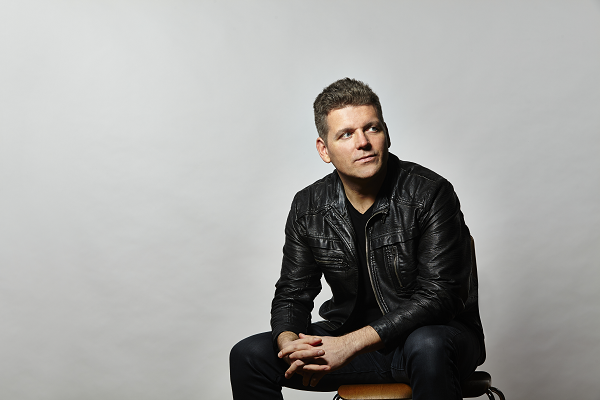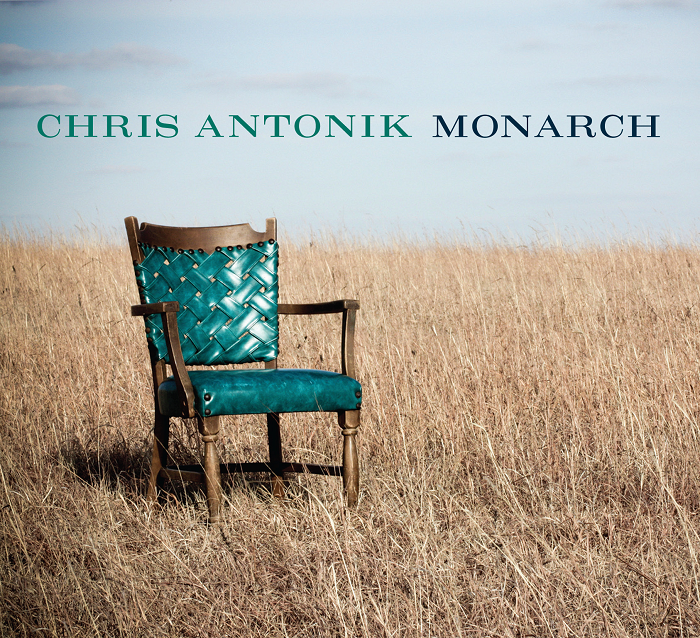With the release of his new album, “Monarch,” Chris Antonik is opening a new chapter in his musical career – a more personal, inward-focused approach that sees Antonik exploring questions of forgiveness, redemption, and moving past the inevitable stumbling blocks of life.
“Monarch” is full of the exquisite, fiery guitar solos and blues hooks for which Antonik is justifiably acclaimed. The album opens with some of those riffs in “I’d Burn It All Down (For You).” Other highlights in this terrific album include “The Monarch and the Wrecking Ball,” a slow-burning jewel of a blues song, and the contemplative “Forgiveness Is Free,” a meditative tune complete with a guitar solo that reminds me strongly of some of David Gilmour’s tuneful riffs.
Chris Antonik very graciously agreed to talk with us about his new album.
Some musicians might be cautious about opening up their inner/private life to audiences with their songs, but you’ve chosen a very personal path in this project. Were you at all concerned about that? Or did it seem that the message you had to convey was important enough to share those parts of yourself?
It’s a great question. I feel I just had to say these things. This is what the music was meant to be about, as it encapsulates the last few years of my life, including some personal struggles and a recent divorce. I needed to close out the trilogy in this way. Yes, at first, I was a bit concerned about revealing too much, but I’m ok with the level of reveal.
The point is, at least for me, in songwriting, the personal catharsis/release happens when you start composing, getting the ideas out of your system. This part is always quite private, i.e. the initial point form notes on paper, or chords into my iphone recorder. After this, a different process takes hold, whereby I try to craft and mold the developing song into something that others can relate to for their own lives. Make it universal. Not for every song, but some. Some of these tunes started forming as early as 2015, so I had already expelled some things from my emotional and psychological systems back then. The second and third steps – refining and recording – are, in some cases, really about the listener. I satisfy my ego early on and there comes a time to give back. It’s unhealthy to be so focused on yourself for such a drawn out time (i.e. a year to make a record). I tried to reveal just enough about my private life, and then let the listener take it from there.
I think the themes in my new songs are powerful and universal enough (e.g. forgiveness, moving on, letting go) that other can find their own meaning, especially with how unforgiving the world seems right now with Trump. I figured, if I could create some positive messages for people, it couldn’t hurt.

On your previous album, “Better for You,” you shared the lead vocal duties with several other singers. How different was the experience this time around, where you’re singing lead on all the songs?
My previous approach to lead vocals on my first two records was to invite more powerful, talented and nuanced vocalists to help fulfill my musical vision. People like Shakura S’Aida, Josh Williams and Mike Mattison (Tedeschi Trucks Band) are such formidable singers, and I needed that extra firepower. By now though I feel I have developed my voice after years of touring and recording. I feel I have found my voice. I approach singing now like I used to approach blues licks when I was learning guitar – i.e. unafraid to make mistakes, learn, refine. I treat it like a new instrument that opens up so many technical and emotional doors. It’s exciting. It’s my own musical journey I guess. I really enjoyed singing all the songs this time. Of course, you can always get better. I’ll just keep developing my voice more over time.
We did so much work on vocals in the studio and I feel I am really prepared for the upcoming tour. My producer really pushed me and made me work hard. I also have vocal warm up exercises on my iphone that my kids sing along with.
Many people might view the blues genre of music as one that focuses on the darker aspects of relationships, but you’ve framed messages of positivity and forgiveness within the blues context here – how do you see blues music as a canvas for what a musician is trying to convey?
I think that blues can convey a range of emotions. That’s really what it is all about. It’s not just sad music. It’s joyful too. I also think it’s important to mess with the genre, try new things, innovate and challenge it. That’s how genres grow and evolve.
At the end of the day, I don’t even really consider myself a pure blues artist. I would call myself a blues-rock guitarist and artist creating original songs. It’s nothing new. Every decade has had its blues-based innovators. I like to think I am adding to the conversation, or at least doing my best. The only thing new here is that these are songs you’ve not heard before. You are hearing my personal story.
This is your third album, I believe – what are some of the lessons you learned in making the first two that you’ve applied to this project?
A key lesson learned was to make sure this record was done entirely on a vintage analog recording console, as opposed to a digital one. This provides a superior, immersive, and more textured sound quality. We recorded at Toronto’s Canterbury Studios with the amazing Jeremy Darby and Julian Decorte engineering.
Another lesson was to trust my instincts rhythmically. On this album, I really wanted to approach the drumming in a special way. Get “exactly” what was in my head, and not an approximation. I asked my friend Chuck Keeping to join the project. Chuck not only plays with Big Wreck, but is also a highly accomplished blues drummer. I brought him in not only because of his raw talent, but because we’re friends and we communicate extremely well. He knew exactly what I was going for. I had no problem conveying drum patterns to him verbally. Not being a drummer myself, this was very important.
Another thing I always wanted to do was tap into my hip-hop influences from my youth. Back in high school, I had a hip hop phase (1989-1992). A lot of the music coming out at that time used samples of old blues and soul drum tracks from the 1960’s and 70’s (e.g. Lee Dorsey-Biz Markie; Albert King-House of Pain). Then around 1993/94, when I was first learning blues guitar, I started discovering where all these samples came from. I think that hip hop, in a weird, mobius loop kind of way, actually influenced my guitar attack. So, for some songs on this album, we attempted to create drum patterns and sounds that a hip hop artist would have sampled in 1989. We over-indulged and used every microphone in the room!
Your song “New Religion” speaks mostly to its effects on your life – and indeed, the changes in your life are a consistent theme throughout the album. Apart from the changes in you personally, in what ways have they translated into changes in how you approach your music?
I am hoping to be even more of a craftsman. Take my time. Get it even better. I took my time with this record to get it right, and I wish to approach my live act that way this year. I always did take things seriously in the past, but I think, as I start this new chapter in my personal life, that I can take time to get things right and do an even better job. Life has been very hectic for me over the last several years with family, touring, recording. Now being divorced and starting a new chapter, I will have less stress and more time to focus on parenting first and my musical craft. A winnowing of life’s energy. I think this will make me a better person and will create conditions for more good music.
You have a number of shows already booked for this spring and summer – are you eager to get out on the road and share these songs live?
Yes! Recording and playing live are entirely different animals. As pleased as I am with this record, it was a very tiring process, especially as it was recorded during a divorce. However, I am well rested, optimistic and ready to go. It will be a nice change to just have fun and make some music. Looking forward to seeing so many friends and fans in the various Canadian cities we’ll play. Also looking forward to playing in some new American cities for the first time.
~ L
Photo credit: Gordon Hawkins


